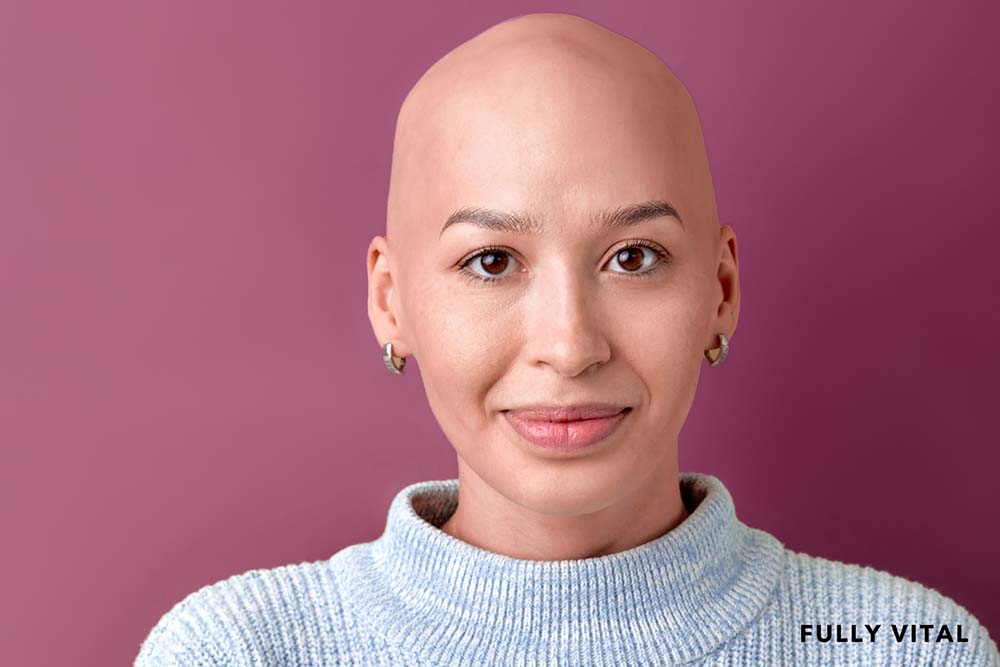
Alopecia Totalis: Understanding And Managing This Condition
Hair loss can be a challenging experience, especially for women who are seeking ways to stimulate hair growth.
One particular condition that affects many is alopecia totalis.
In this article, we will cover all the essential aspects of alopecia totalis, its causes, how it works, and potential alternatives.
Let's dive in!

I LOVE MY HAIR NOW
FullyVital hair serum and hair vitamins made tremendous improvements in my hair. I truly love my hair now.
Dorit S.,
What Is Alopecia Totalis?
Alopecia totalis is a type of hair loss condition characterized by the complete loss of hair on the scalp.1
It is an advanced form of alopecia areata, a condition where hair loss occurs in patches.
With alopecia totalis, individuals lose all the hair on their head, including the scalp, leading to complete baldness.
This condition can be emotionally distressing and may affect both men and women of all hair types.

Why Is Awareness Of Alopecia Totalis Important?
Raising awareness about alopecia totalis is crucial to provide support and understanding to those affected by the condition.2
By increasing awareness, we can reduce the stigma surrounding hair loss and promote empathy and compassion for individuals experiencing this challenge.
Additionally, awareness campaigns can encourage research and funding for finding effective treatments and potential cures for alopecia totalis.
How Does Alopecia Totalis Work?
The exact cause of alopecia totalis is not fully understood, but it is believed to be an autoimmune disorder.
The immune system mistakenly attacks hair follicles, leading to hair loss.
Genetic factors may also play a role in predisposing individuals to develop this condition.
Hair growth products for alopecia totalis often aim to regulate the immune response and stimulate hair follicles to promote regrowth.
What Are The Causes Of Alopecia Totalis?
While the precise cause of alopecia totalis remains unknown, several factors are believed to contribute to its development:
Autoimmune Response
The immune system attacks hair follicles mistakenly.
Genetics
Family history of alopecia or autoimmune disorders may increase the risk.
Environmental Triggers
Certain events, stressors, or illnesses might trigger the condition in susceptible individuals.
Are There Any Downsides To Alopecia Totalis?
Alopecia totalis can have significant emotional and psychological impacts on those affected.3
The sudden and complete loss of hair can lead to decreased self-esteem, body image issues, and increased stress and anxiety.
Coping with this condition can be challenging, but with the right support and treatment, individuals can find ways to manage and embrace their appearance.
What Are The Alternatives To Prevent Alopecia Totalis?
For individuals looking to stimulate hair growth and address alopecia totalis, there are several alternatives to consider:
Hair Growth Products
Specialized hair growth products containing minoxidil, biotin, or other active ingredients may help promote hair regrowth.
Scalp Micropigmentation
A non-invasive cosmetic procedure that creates the appearance of a closely shaved head or adds density to existing hair.
Wigs And Hairpieces
High-quality wigs and hairpieces offer a temporary solution for concealing hair loss.
Hair Transplant
Surgical hair transplantation can be an option for some individuals, although it might not be suitable for everyone.
What Is The History Of Alopecia Totalis?
The history of alopecia totalis is essential to understand how our understanding and approach to this condition have evolved over time.
While exact records of the condition's origin are scarce, historical accounts and research reveal some key points:
-
Ancient References: Some historical texts and artifacts suggest that hair loss conditions similar to alopecia totalis were recognized in ancient civilizations.
-
Early Medical Observations: Medical records from the past centuries mention cases of severe hair loss, potentially resembling alopecia totalis.
-
Advancements in Dermatology: With the advancement of dermatology in the 19th and 20th centuries, there was increased attention to hair loss disorders, including alopecia areata.
-
Research Breakthroughs: In recent decades, significant progress has been made in understanding the autoimmune basis of alopecia areata, paving the way for potential treatments.
What Is The Current Environment Of Alopecia Totalis?
Understanding the current environment of alopecia totalis is crucial for addressing the needs of those affected and developing effective solutions.
Some key aspects of the current scenario include:
-
Increasing Awareness: Efforts by organizations, social media, and patient support groups have led to greater awareness of alopecia totalis and its impact on individuals.
-
Advancements in Treatments: Medical research has resulted in various treatment options that aim to stimulate hair regrowth and manage the condition.
-
Emphasis on Mental Health: Recognition of the emotional toll of alopecia totalis has led to increased focus on mental health support for those affected.
-
Accessibility of Information: The internet has provided a platform for individuals to access information, share experiences, and seek advice about alopecia totalis.
What Is The Future Of Alopecia Totalis?
As we look ahead, the future of alopecia totalis holds promise for improved care and support.
Some potential developments include:
-
Advanced Therapies: Ongoing research may lead to more targeted and effective therapies, including potential gene therapies and immunomodulatory treatments.
-
Personalized Medicine: Advancements in genetics and personalized medicine may enable tailored treatments based on an individual's specific genetic profile.
-
Holistic Approach: There is a growing trend towards a holistic approach to managing alopecia totalis, encompassing both physical and emotional well-being.
-
Collaboration and Advocacy: Collaborative efforts among researchers, medical professionals, patients, and advocacy groups may drive faster progress in understanding and treating alopecia totalis.
Is There A Specific Age Range When Alopecia Totalis Is More Likely To Develop?
Alopecia totalis can affect individuals of all ages, but it commonly emerges during late childhood, adolescence, or early adulthood.
While there's no strict age range for its development, it tends to be more prevalent in people under the age of 30.
However, it's essential to remember that alopecia totalis can occur at any stage of life, and its onset may vary from person to person.
Can Alopecia Totalis Affect Body Hair As Well?
Yes, alopecia totalis can extend beyond the scalp and affect other areas of the body with hair, a condition known as alopecia universalis.
In cases of alopecia universalis, individuals experience complete hair loss not only on the scalp but also on the eyebrows, eyelashes, beard, and body hair.
This more extensive form of alopecia can present additional challenges for those affected.
Are There Any Natural Remedies Or Home Treatments For Alopecia Totalis?
While there is no definitive natural cure for alopecia totalis, some home remedies and treatments may complement professional therapies.
It's important to note that individual responses to these remedies can vary, and consulting with a healthcare professional before trying them is advisable.
Some potential natural remedies and home treatments include:
-
Scalp Massage: Regular scalp massages may stimulate blood flow to the hair follicles.
-
Essential Oils: Certain essential oils like lavender, rosemary, and peppermint may have beneficial effects when applied to the scalp.
-
Aloe Vera Gel: Applying aloe vera gel to the scalp could help soothe and nourish the skin.
-
Nutrition Supplements: Supplements containing biotin, zinc, iron, or vitamin D may support overall hair health.
-
Stress Reduction Techniques: Managing stress through relaxation, meditation, or yoga might have a positive impact on hair health.
What Role Does Diet And Nutrition Play In Managing Alopecia Totalis?
A well-balanced diet and proper nutrition are crucial factors in managing alopecia totalis and supporting overall hair health.
Nutrient-rich foods can provide the essential vitamins and minerals necessary for hair growth.
Consider incorporating the following nutrients into your diet:
-
Protein: Found in foods like lean meats, fish, eggs, and legumes, protein is essential for hair structure and growth.
-
Omega-3 Fatty Acids: Present in fatty fish, chia seeds, and flaxseeds, these healthy fats can help reduce inflammation and promote scalp health.
-
Vitamins: Vitamin A, C, D, E, and Biotin are vital for hair growth and can be obtained from fruits, vegetables, and supplements.
-
Iron: Foods like spinach, lentils, and red meat can provide the iron necessary for healthy hair follicles.
Maintaining a nutritious diet can significantly contribute to hair regrowth and overall well-being.
Can Stress Management Techniques Help With Alopecia Totalis?
While stress doesn't directly cause alopecia totalis, managing stress levels is essential for overall health and well-being, which can indirectly affect hair health.
High levels of stress can trigger or exacerbate certain autoimmune conditions, including alopecia areata, leading to more severe hair loss.
Therefore, adopting stress management techniques can potentially help in coping with alopecia totalis. Some effective stress management techniques include:
-
Regular Exercise: Physical activity can reduce stress hormones and boost mood-enhancing endorphins.
-
Mindfulness Meditation: Practicing mindfulness can promote relaxation and reduce anxiety.
-
Deep Breathing Exercises: Controlled breathing techniques can help calm the mind and body during stressful situations.
-
Engaging Hobbies: Pursuing enjoyable hobbies can serve as a distraction and provide a sense of accomplishment.
Call to Action: Experience the Power of Rejuvenated Hair with Fully VitalAre you yearning for a healthier and more vibrant relationship with your locks? Look no further! Fully Vital presents a range of revolutionary hair growth products that combat the aging process of your hair, leaving you with luscious and youthful-looking tresses. Key Features and Benefits:
Revitalize your hair and rediscover the joy of feeling confident in your own skin. Join us on our mission to unlock the potential of your hair with Fully Vital's powerful hair growth products. Love your locks. Love yourself. Choose Fully Vital today. |
Final Thoughts On Alopecia Totalis
Alopecia totalis is a challenging condition that can significantly impact individuals of all hair types, particularly women seeking to stimulate hair growth.
By delving into the history, current environment, and potential future of alopecia totalis, we've gained valuable insights into the complexities of this condition and the efforts to address it.
At Fully Vital, we understand the importance of a healthy relationship with your locks.
Our range of hair growth products is designed to halt the aging process of your hair and promote regrowth, offering hope and support to those affected by alopecia totalis.
We believe in empowering confidence and embracing natural beauty, and our products are carefully crafted to cater to the diverse needs of our valued customers.
Frequently Asked Questions About Alopecia Totalis
Can alopecia totalis be cured completely?
Unfortunately, there is no definitive cure for alopecia totalis at present. However, some treatments can stimulate hair regrowth.
Are there any specific triggers for alopecia totalis flare-ups?
Triggers can vary from person to person but might include stress, illness, or hormonal changes.
Is alopecia totalis hereditary?
Yes, there is evidence of a genetic component to alopecia totalis and alopecia areata.
Do hair growth supplements help with alopecia totalis?
While supplements may support overall hair health, they might not be sufficient on their own to treat alopecia totalis.
Can children develop alopecia totalis?
Yes, children can also be affected by alopecia totalis, and it can be particularly challenging for them emotionally.
Does wearing hats or scarves worsen alopecia totalis?
There is no evidence to suggest that wearing hats or scarves directly worsens the condition.
Can stress cause alopecia totalis?
Stress can be a contributing factor to alopecia areata, but its exact role in alopecia totalis is not entirely clear.
Are there any known side effects of alopecia totalis treatments?
Some treatments may have side effects, so it's essential to discuss potential risks with a healthcare professional.
Can alopecia totalis lead to other health issues?
Alopecia totalis is primarily a cosmetic concern and does not typically lead to other health problems.
Is it possible to regrow hair naturally without treatments?
While some individuals may experience spontaneous regrowth, treatments often increase the chances of significant hair regrowth.
Source:
-
Hair loss types: Alopecia areata overview. (n.d.). Www.aad.org. Retrieved August 4, 2023, from https://www.aad.org/public/diseases/hair-loss/types/alopecia#:~:text=This%20patchy%20baldness%20can%20develop
-
Buckley, J., & Rapini, R. P. (2021). Totalis Alopecia. PubMed; StatPearls Publishing. https://www.ncbi.nlm.nih.gov/books/NBK563225/
-
Emotional Wellness and Mental Health. (n.d.). National Alopecia Areata Foundation | NAAF. https://www.naaf.org/emotional-wellness-and-mental-health/#:~:text=A%20study%20published%20in%202022






